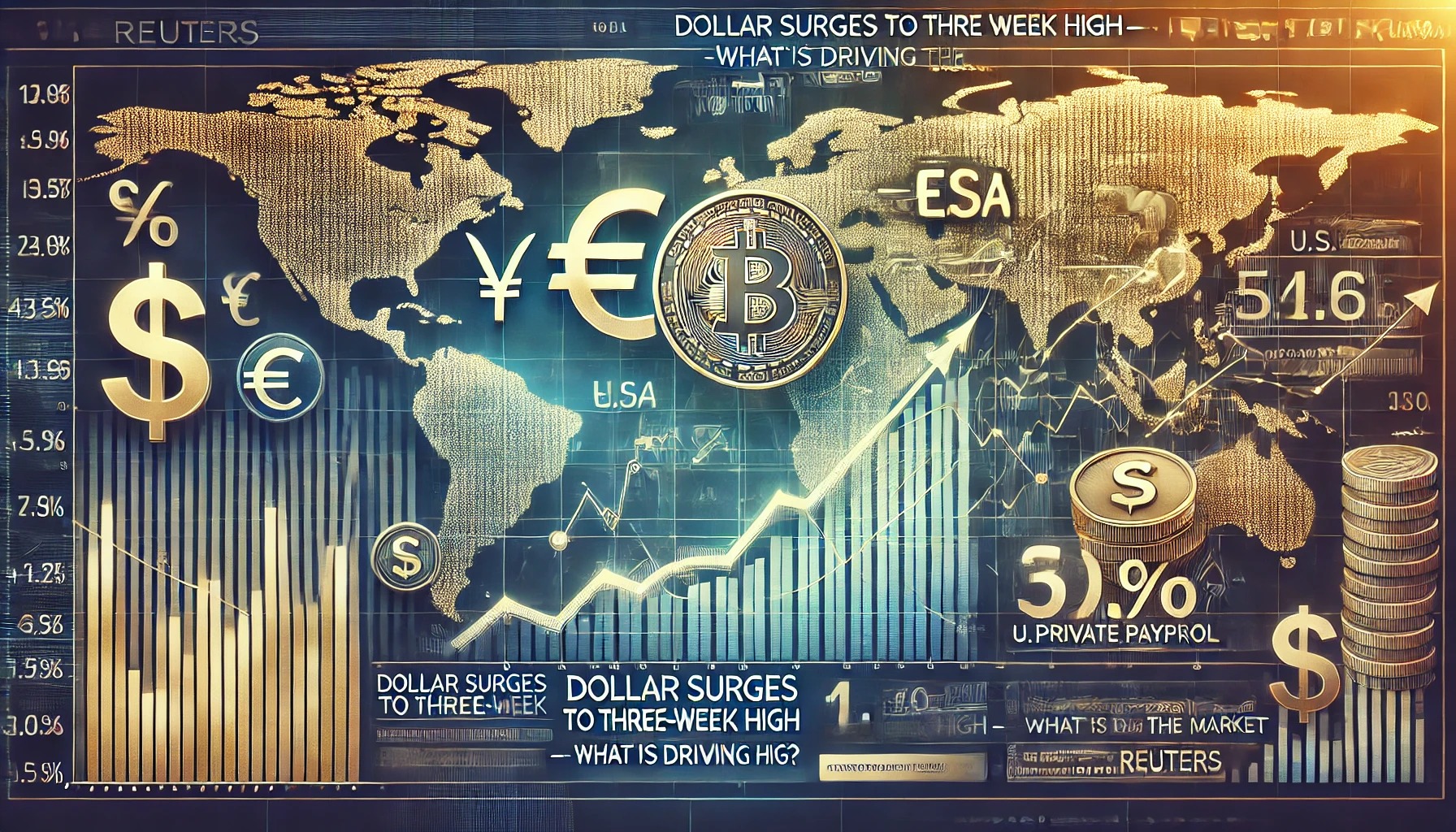The dollar hit a three-week high against the euro on Wednesday, spurred by stronger-than-expected U.S. private payroll growth for September, as reported by the ADP National Employment Report. This data comes ahead of Friday’s key jobs report, driving market attention.
Traders are closely monitoring the rising geopolitical tensions following a missile attack by Iran on Israel, which stokes fears of a broader conflict in the oil-rich Middle East. Such developments have bolstered demand for the safe-haven dollar.
According to the ADP report, private payrolls increased by 143,000 jobs last month, following an upward revision to 103,000 in August. Economists had anticipated an increase of only 120,000 jobs. “The ADP number looked pretty good and points to a decent NFP print,” said Brad Bechtel, global head of FX at Jefferies in New York.
The highly anticipated U.S. nonfarm payrolls report is expected to show an increase of 140,000 jobs in September, with the unemployment rate remaining steady at 4.2%, as per a Reuters poll. The combination of solid economic data and hawkish remarks by Federal Reserve Chair Jerome Powell earlier in the week has given the dollar a boost. This has led traders to reconsider the likelihood of a 50-basis-point rate cut by the Fed in its upcoming meeting.
"There’s a subtle shift happening where the U.S. is perceived with less risk, and expectations of aggressive rate cuts have toned down," Bechtel added.
Current market pricing indicates a 35% probability of a 50-basis-point rate cut during the Federal Reserve’s Nov. 6-7 meeting, a drop from 57% just a week ago, according to CME Group’s FedWatch Tool.
Richmond Fed President Thomas Barkin indicated that last month’s 50-basis-point rate cut aimed to realign the policy rate with economic conditions and did not signal the end of efforts to combat inflation. Additionally, the Institute for Supply Management's non-manufacturing report, due Thursday, is anticipated to shed further light on the health of the U.S. economy.
The dollar index increased by 0.42% to 101.68, marking its highest level since September 11, while the euro slipped 0.27% to $1.1037. Growing expectations of an interest rate cut by the European Central Bank (ECB), as inflation trends closer to the ECB’s 2% target, have weighed on the euro. ECB board member Isabel Schnabel noted that inflation is likely to ease, dropping her cautionary stance on persistent price growth.
The yen also weakened against the dollar following remarks by Prime Minister Shigeru Ishiba, suggesting Japan is not in an environment for an additional rate increase. The dollar climbed 1.94% to 146.34 yen.
Beyond currency markets, the greenback has attracted safe-haven demand due to Middle Eastern tensions. Israel's Prime Minister Benjamin Netanyahu vowed retaliation against Iran for Tuesday's missile strike, while Iran warned of “vast destruction” in response to any retaliation, raising fears of a broader regional conflict.
In the cryptocurrency market, Bitcoin edged lower by 0.11%, trading at $60,712.



 Gold Prices Slide Below $5,000 as Strong Dollar and Central Bank Outlook Weigh on Metals
Gold Prices Slide Below $5,000 as Strong Dollar and Central Bank Outlook Weigh on Metals  Gold and Silver Prices Rebound After Volatile Week Triggered by Fed Nomination
Gold and Silver Prices Rebound After Volatile Week Triggered by Fed Nomination  Silver Prices Plunge in Asian Trade as Dollar Strength Triggers Fresh Precious Metals Sell-Off
Silver Prices Plunge in Asian Trade as Dollar Strength Triggers Fresh Precious Metals Sell-Off  Dow Hits 50,000 as U.S. Stocks Stage Strong Rebound Amid AI Volatility
Dow Hits 50,000 as U.S. Stocks Stage Strong Rebound Amid AI Volatility  Russian Stocks End Mixed as MOEX Index Closes Flat Amid Commodity Strength
Russian Stocks End Mixed as MOEX Index Closes Flat Amid Commodity Strength  India–U.S. Interim Trade Pact Cuts Auto Tariffs but Leaves Tesla Out
India–U.S. Interim Trade Pact Cuts Auto Tariffs but Leaves Tesla Out  Trump Lifts 25% Tariff on Indian Goods in Strategic U.S.–India Trade and Energy Deal
Trump Lifts 25% Tariff on Indian Goods in Strategic U.S.–India Trade and Energy Deal  Dollar Steadies Ahead of ECB and BoE Decisions as Markets Turn Risk-Off
Dollar Steadies Ahead of ECB and BoE Decisions as Markets Turn Risk-Off  Japan Economy Poised for Q4 2025 Growth as Investment and Consumption Hold Firm
Japan Economy Poised for Q4 2025 Growth as Investment and Consumption Hold Firm  Fed Governor Lisa Cook Warns Inflation Risks Remain as Rates Stay Steady
Fed Governor Lisa Cook Warns Inflation Risks Remain as Rates Stay Steady  Singapore Budget 2026 Set for Fiscal Prudence as Growth Remains Resilient
Singapore Budget 2026 Set for Fiscal Prudence as Growth Remains Resilient  U.S.-India Trade Framework Signals Major Shift in Tariffs, Energy, and Supply Chains
U.S.-India Trade Framework Signals Major Shift in Tariffs, Energy, and Supply Chains  Global Markets Slide as AI, Crypto, and Precious Metals Face Heightened Volatility
Global Markets Slide as AI, Crypto, and Precious Metals Face Heightened Volatility  Trump Endorses Japan’s Sanae Takaichi Ahead of Crucial Election Amid Market and China Tensions
Trump Endorses Japan’s Sanae Takaichi Ahead of Crucial Election Amid Market and China Tensions  South Korea’s Weak Won Struggles as Retail Investors Pour Money Into U.S. Stocks
South Korea’s Weak Won Struggles as Retail Investors Pour Money Into U.S. Stocks  Asian Stocks Slip as Tech Rout Deepens, Japan Steadies Ahead of Election
Asian Stocks Slip as Tech Rout Deepens, Japan Steadies Ahead of Election  South Korea Assures U.S. on Trade Deal Commitments Amid Tariff Concerns
South Korea Assures U.S. on Trade Deal Commitments Amid Tariff Concerns 































